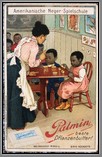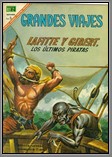Civil Rights/Slavery
Fact card produced in 1993 by Atlas Editions about Dred Scott. Dred Scott (c. 1799 – September 17, 1858) was an enslaved African-American man in the USA who unsuccessfully sued for his freedom and that of his wife, Harriet, and their two daughters in the Dred Scott v. Sandford case of 1857, popularly known as the "Dred Scott decision". Scott claimed that he and his wife should be granted their freedom because they had lived in Illinois and the Wisconsin Territory for four years, where slavery was illegal and their laws said that slaveholders gave up their rights to slaves if they stayed for an extended period. In a landmark case, the United States Supreme Court decided 7–2 against Scott, finding that neither he nor any other person of African ancestry could claim citizenship in the USA, and therefore Scott could not bring suit in federal court under diversity of citizenship rules. Moreover, Scott's temporary residence outside Missouri did not bring about his emancipation under the Missouri Compromise, as the court ruled this to have been unconstitutional, as it would "improperly deprive Scott's owner of his legal property". While Chief Justice Roger B. Taney had hoped to settle issues related to slavery and Congressional authority by this decision, it aroused public outrage, deepened sectional tensions between the northern and southern states, and hastened the eventual explosion of their differences into the American Civil War. The Scotts were manumitted by a private arrangement in May 1857. Dred Scott died of tuberculosis a year later. Detail on back. BB
Price: $30.00
Fact card produced in 1993 by Atlas Editions about Mum Bett. Elizabeth Freeman (c.1744 – December 28, 1829), also known as Bet, Mum Bett, or MumBet, was the first enslaved African American to file and win a freedom suit in Massachusetts. The Massachusetts Supreme Judicial Court ruling, in Freeman's favor, found slavery to be inconsistent with the 1780 Massachusetts State Constitution. Her suit, Brom and Bett v. Ashley (1781), was cited in the Massachusetts Supreme Judicial Court appellate review of Quock Walker's freedom suit. When the court upheld Walker's freedom under the state's constitution, the ruling was considered to have implicitly ended slavery in Massachusetts. Detail on back. B
Price: $30.00












